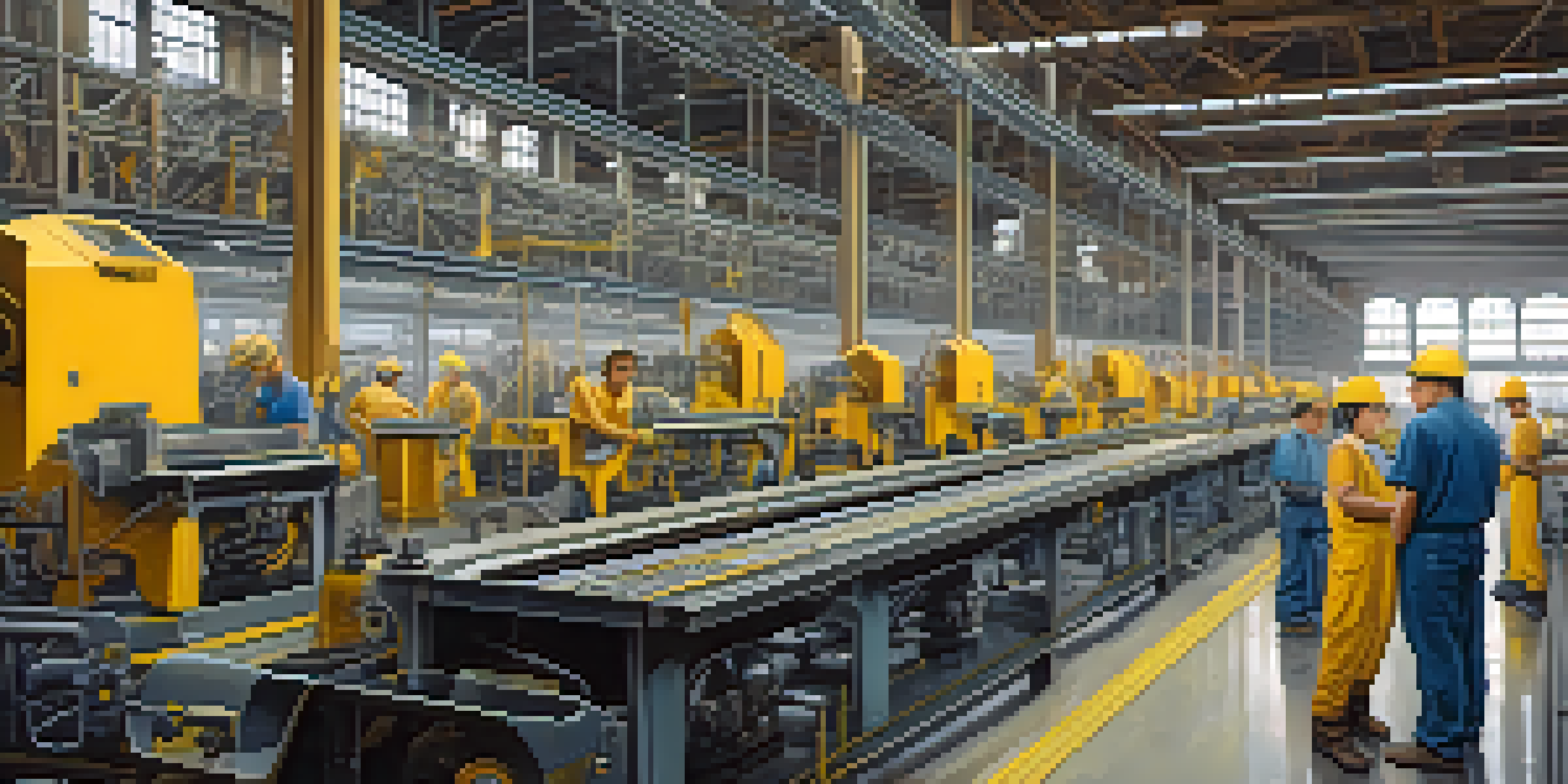How Detroit Became a Hub for Global Supply Chains

The Historical Importance of Detroit in Industry
Detroit has long been known as the heart of America’s automotive industry. In the early 20th century, it was here that Henry Ford revolutionized manufacturing with the assembly line, making cars accessible to the masses. This industrial innovation laid the groundwork for a robust infrastructure that would later support global supply chains. The city’s rich history in manufacturing made it a natural choice for companies looking to optimize production and logistics.
Detroit is a city that is continuously evolving, balancing its rich history with the need for innovation in manufacturing and supply chains.
Over the decades, Detroit expanded beyond automobiles, attracting various industries such as aerospace, technology, and consumer goods. This diversification not only strengthened the local economy but also enhanced the city’s reputation as a manufacturing hub. As businesses began to seek more efficient ways to operate, Detroit’s established network of suppliers and manufacturers became increasingly attractive. The historical roots of manufacturing have made it easier for new companies to tap into existing resources and expertise.
Moreover, the city's location plays a crucial role in its industrial prominence. Situated near the Canadian border and major U.S. highways, Detroit has become a strategic logistics center. This geographical advantage allows for easy access to international markets, making it an ideal location for companies aiming to streamline their supply chains.
Infrastructure Development: Key to Supply Chain Success
Detroit's infrastructure has played a pivotal role in its emergence as a global supply chain hub. The city boasts a comprehensive network of highways, railroads, and ports, facilitating the smooth movement of goods. This connectivity is essential for companies that rely on timely deliveries and efficient logistics. A well-developed infrastructure ensures that products can be shipped quickly and cost-effectively, which is vital in today’s fast-paced market.

In recent years, significant investments have been made to upgrade the city’s transportation systems and facilities. These improvements enhance the overall efficiency of the supply chain, making it easier for businesses to operate. For example, the expansion of the Detroit-Windsor Tunnel has improved cross-border trade with Canada, further solidifying Detroit's role in international supply chains.
Detroit: A Manufacturing Powerhouse
Detroit's rich history in manufacturing, especially in the automotive industry, has established it as a key player in global supply chains.
Additionally, the development of technology-driven logistics solutions has complemented the physical infrastructure. Companies are now utilizing advanced tracking systems and automation to optimize their supply chains. This blend of traditional infrastructure and modern technology positions Detroit as a forward-thinking hub in the global marketplace.
The Role of Technology in Supply Chain Evolution
As technology continues to advance, it plays a critical role in shaping supply chains across the globe. In Detroit, businesses are leveraging cutting-edge technologies such as artificial intelligence, machine learning, and blockchain to streamline operations. These innovations help companies predict demand, manage inventory, and enhance transparency throughout the supply chain. By adopting these technologies, Detroit is not only keeping pace with global trends but also setting new standards for efficiency.
The future of Detroit will be defined by our ability to adapt and collaborate, ensuring we remain competitive in the global marketplace.
Moreover, partnerships between local universities and industries foster a culture of innovation. Research institutions in Detroit are collaborating with businesses to develop new technologies that address specific supply chain challenges. This synergy between academia and industry creates a pipeline of skilled talent, ensuring that companies have access to the expertise needed to thrive in a competitive market.
The integration of technology into supply chains also supports sustainability efforts. Many companies in Detroit are looking for ways to reduce their environmental impact, and technology can play a key role in achieving these goals. For instance, data analytics can help optimize routes to minimize fuel consumption, while automation can reduce waste in production processes.
Skilled Workforce: The Heart of Detroit's Supply Chains
A skilled workforce is essential for any successful supply chain, and Detroit is home to a diverse talent pool. The city has a long tradition of manufacturing, which means that many workers possess valuable skills and experience. Additionally, local universities and technical schools are actively preparing students for careers in supply chain management and logistics. This focus on education ensures that companies have access to a workforce capable of meeting the demands of a dynamic industry.
Furthermore, Detroit’s commitment to workforce development includes various training programs aimed at upskilling employees. These initiatives are particularly important as technology continues to evolve, requiring workers to adapt to new tools and processes. By investing in its workforce, Detroit not only benefits individual companies but also strengthens the overall supply chain ecosystem.
Infrastructure Fuels Supply Chain Growth
The city's extensive network of highways, railroads, and ports enhances logistics efficiency, positioning Detroit as a vital logistics hub.
The city also embraces diversity, which enhances creativity and problem-solving within the workforce. A diverse team brings different perspectives and ideas, fostering innovation in supply chain management. This inclusive approach to talent acquisition positions Detroit as a leader in developing adaptable and resilient supply chains.
Partnerships and Collaboration Drive Supply Chain Growth
Collaboration is key to the success of any supply chain, and Detroit exemplifies this principle through its partnerships. The city encourages cooperation among various stakeholders, including manufacturers, suppliers, and logistics providers. These collaborative efforts create a more cohesive supply chain network, allowing for better communication and coordination. When companies work together, they can identify challenges and develop innovative solutions that benefit all parties involved.
Industry associations and local government play a vital role in fostering these partnerships. Initiatives aimed at connecting businesses and promoting best practices help strengthen the supply chain community in Detroit. For example, local chambers of commerce often host networking events that bring together different sectors, encouraging dialogue and collaboration.
Moreover, public-private partnerships are becoming increasingly common in Detroit. Government investment in infrastructure and business development supports the growth of local supply chains, while private companies contribute their expertise and resources. This symbiotic relationship enhances the city’s ability to adapt to changing market demands and positions it as a hub for global supply chains.
Challenges Facing Detroit's Supply Chain Landscape
Despite its many strengths, Detroit's supply chain landscape is not without challenges. One of the most pressing issues is the need for ongoing investment in infrastructure. While significant improvements have been made, aging facilities and limited resources can hinder efficiency. Businesses must continue to advocate for funding and support to ensure that the city remains competitive on a global scale.
Additionally, the fluctuating global economy poses risks to supply chains in Detroit. Economic downturns can disrupt production and logistics, leading to delays and increased costs. Companies must remain agile and adaptable, ready to pivot in response to market changes. Developing contingency plans and diversifying suppliers can help mitigate these risks.
Innovation Drives Future Success
By embracing technology and fostering collaboration among industries and educational institutions, Detroit is set to lead in supply chain advancements.
Finally, workforce shortages in key sectors can also impact supply chain operations. As companies expand and evolve, they often struggle to find qualified candidates to fill critical roles. Addressing this challenge requires a concerted effort from both the public and private sectors to promote education and training programs that align with industry needs.
The Future of Detroit as a Supply Chain Leader
Looking ahead, Detroit is poised to strengthen its position as a leader in global supply chains. The city's rich history in manufacturing, combined with ongoing investments in technology and infrastructure, creates a solid foundation for future growth. As businesses continue to embrace innovation and collaboration, Detroit will remain a vital player in the global marketplace.
Moreover, the city's focus on sustainability and social responsibility will likely shape the future of its supply chains. Companies are increasingly prioritizing environmentally friendly practices, which can lead to healthier communities and a more resilient economy. By aligning with these values, Detroit can attract businesses that prioritize ethical practices and long-term sustainability.

Ultimately, Detroit’s ability to adapt to changing trends and challenges will determine its future in the global supply chain landscape. By fostering a culture of innovation, collaboration, and resilience, the city can continue to thrive and serve as a blueprint for other regions looking to enhance their supply chain capabilities.